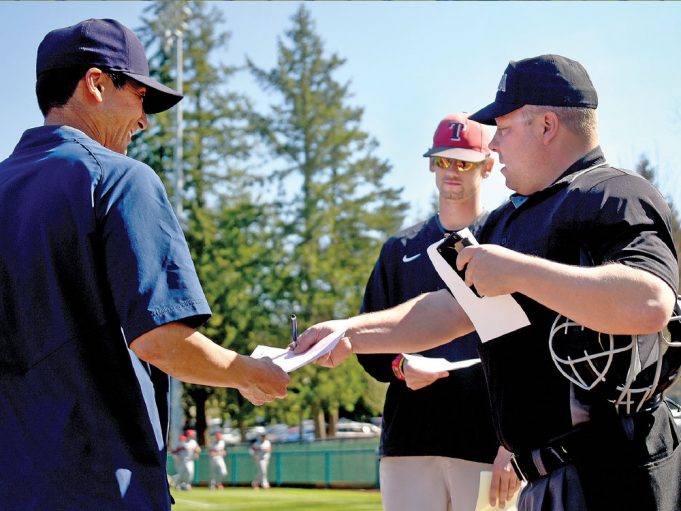Pat the referee arrives at Hometeam High School for a basketball game. With Chris, the inexperienced partner, in tow, Pat approaches Hometeam Head Coach Johnson. “Hi, Coach Johnson,” says Pat, giving the coach a vigorous handshake and a slap on the shoulder.
“Pat! Great to see you!” replies Coach Johnson, returning the shoulder slap.
“How’s the team look this year, Coach?” Pat asks. “Not bad. Not bad,” Coach Johnson replies. “Hey, Pat, I don’t know if you’ve heard anything about it, but see number 30 warming up over there?” Coach Johnson points to a visiting team player. “Big trouble. Dirty player. Got a bad reputation. Mouths off all the time to the referees and they let it go because of all the college scouts showing up every night.”
“Oh, thanks for letting me know,” Pat says. Their conversation continues for several more minutes. Never does Pat introduce Chris, the inexperienced partner, who has been a spectator to the conversation. Another interested spectator to the reunion is visiting team Coach Smith. When Pat approaches him, there’s no familiarity. Pat only exchanges a brief greeting, gains the required information and offers a quick, “Good luck,” while walking away, again leaving partner Chris in a lurch.
Coach Smith is not happy. The game hasn’t even started and Pat and Chris are already in for a long night.
Take care of business.
So what did Pat do wrong? Pat was congenial and approachable with both coaches. Unfortunately, Coach Smith saw way more cordiality and familiarity with Coach Johnson. Not to mention Pat twice putting the less-experienced and less well-known partner in an uncomfortable position.
Officials should introduce themselves to each coach equally. Some coaches will engage in friendly comments toward an official he or she knows during the pregame meeting. It is important for an official to downplay that relationship.
You may like some coaches more than others. But you want to convey the message that once the game starts, all that friendliness means nothing and you are just going to call the game the way you see it. That helps establish your credibility.
After introductions, officials should complete sport-appropriate pregame duties, such as reviewing ground rules and obtaining coach confirmation regarding legality of player equipment and uniforms.
Keep them out of your head.
Many coaches will attempt to warn officials in pregame meetings of certain characteristics regarding the opposing team. For example, a football coach may tell a referee that review of game film reveals the opponent is prone to holding along the offensive line. A good response to such a comment might be, “Coach, we always watch for holding.” After that, if the coach wants to continue the discussion, it’s best to cut him or her off and disengage from the conversation. If the coach persists, calling the opposing coach over to include him or her in the conversation will most times quickly bring an end to the discussion. While you don’t want to dismiss such warnings out of hand, you don’t want to promise extra vigilance.
Coaches may ask about the legality of certain plays or strategies. That may or may not be a backdoor method of dishing dirt on the opponent. A good reply might be, “The rule on that is …” without pledging to call it one way or another. Coaches will sometimes manipulate the situation to their benefit or leave out a key element in order to trick you.
Other potentially inappropriate subjects a coach might broach include promises or attempting to glean information on how you’ll call the game. A coach might say, “If you do a good job tonight, I’m sure you’ll get more games next year,” or “The last crew we had called things really tight. How are you going to call it tonight?”
For less-experienced officials, let your partner or crew chief handle the pregame meeting with the coach. You only need to introduce yourself and listen as your more-experienced partner conducts the meeting. Early in your career, you may still be a novice official, but you might find yourself the senior member of your crew, especially in lower-level contests. When that happens, keep your meetings brief and don’t let the coach draw you into a drawn-out conversation.
Meeting the game manager. Just as important as your pregame meeting with coaches is meeting with game management personnel. Ideally, the game manager will seek out the officials when they arrive. The game manager is often the school’s athletic director or other administrator, but in some cases — particularly at the lower levels of competition — that person may be the home team coach. Or there may be no game manager at all.
The game manager’s three basic responsibilities pertaining to officials are security, communication and support. When you meet with the game manager, you should cover the following:
- Introduce yourself and your partners or crewmates.
- Confirm the game’s start time.
- Find out where the game manager will be during the game so you can locate him or her quickly if need be.
- Inform the game manager that if there are any problems with fans, the game will be halted and the game manager will be asked to take care of the problem.
- Inform the game manager he or she may be called upon to help remove any coaches or players who are ejected.
- Thank the game manager for his or her support.
What's Your Call? Leave a Comment:
Note: This article is archival in nature. Rules, interpretations, mechanics, philosophies and other information may or may not be correct for the current year.
This article is the copyright of ©Referee Enterprises, Inc., and may not be republished in whole or in part online, in print or in any capacity without expressed written permission from Referee. The article is made available for educational use by individuals.


















